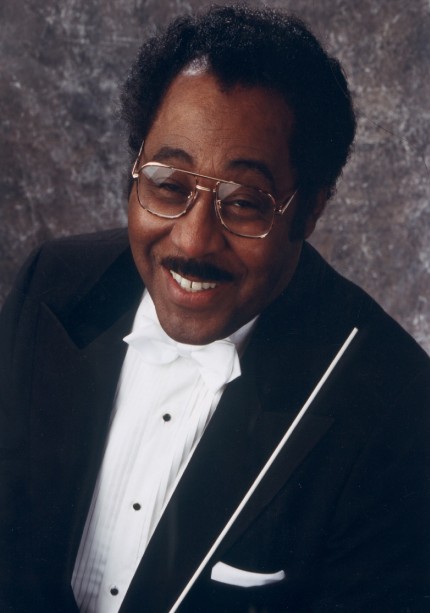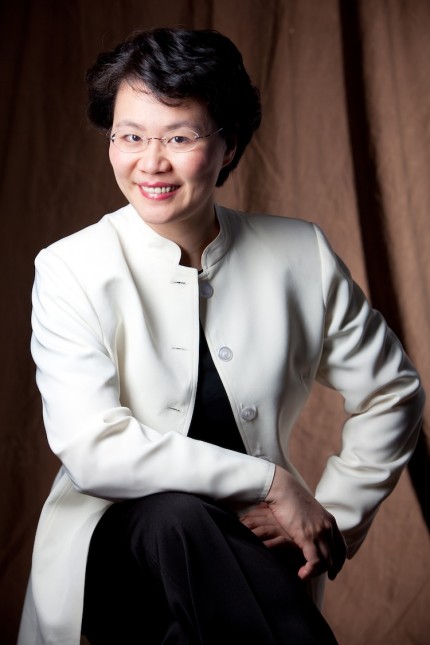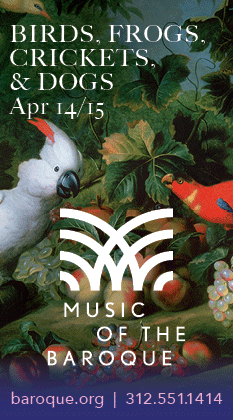Freeman passes Sinfonietta baton to Chen in overstuffed season finale

The closing concert of the Chicago Sinfonietta’s season Monday night at Symphony Center also marked the farewell appearance of Paul Freeman — founder, music director and guiding light who created the diversity-conscious chamber orchestra and led the ensemble for the past 24 years.
Feted earlier by a film homage and fulsome tributes by incoming music director Mei-Ann Chen and others, Freeman appeared on stage at the end of the evening. Physically frail but mentally sharp, the 75-year-old conductor informally regaled the audience with jokes, teased Chen about her age, and, seated, led a fizzing performance of Ginastera’s Estancia before closing the evening by bringing out soprano Elizabeth Norman to lead the audience in a swaying, hand-holding rendition of We Shall Overcome.
Amid the sense of occasion and glimpses of Chen’s own incisive podium style, with three conductors and a violin soloist featured in a decidedly hodgepodge program, the evening tried to cover too many bases, musically and philosophically — perhaps inadvertently reflecting the challenges facing the Taiwanese-born conductor, who officially takes the Sinfonietta helm in the fall.

The good news is that Chen, music director of the Memphis Symphony Orchestra, is a strong conductor and seems the kind of firm podium presence needed to lift the Sinfonietta out of the artistic mediocrity it’s been mired in for the past several years. Also, on a night heavy with verbal bouquets, Chen showed herself an engaging speaker in her introductions and a musician with the personality to follow in her predecessor’s role. Whether she is given the authority to program her own concerts and make the necessary personnel upgrades to take the Sinfonietta to the next level time will tell.
Much of the program concentrated on American women composers, and Chen led off with an atmospheric performance of Jennifer Higdon’s blue cathedral. Though inspired by the passing of the composer’s brother, Higdon’s work is optimistic and colorful rather than tragic, and Chen neatly brought out the radiant scoring, not least the luminous coda with the musicians called upon to play tiny Chinese bells.
Chen also directed the orchestra in a barn-storming ride through the final movement of Ellen Taaffe Zwilich’s Symphony No. 1. Though, at just 17 minutes, it’s unfortunate Zwilich’s concise symphony wasn’t played in its entirety as originally scheduled.
Violinist Elena Urioste, who made a memorable debut with the Chicago Symphony Orchestra last year, was the soloist in Gwyneth Walker’s An American Concerto (1995). Recorded by Freeman and the Sinfonietta, this inoffensive yet nonessential work breathes some of the rustic amiability of William Grant Still. Urioste delivered a stylish and tasteful performance but one wished that this talented musician’s gifts were utilized on more substantial music.
Walker’s lightweight concerto seemed like a masterpiece, however, next to Divertimento Notte blu by Renée Baker, the Sinfonietta’s principal violist, who also conducted this premiere.
Baker’s work is scored for six soloists (baritone sax doubling on didgeridoo, tenor sax, flute, vibes, cello and bass), arrayed across the front of the stage. Yet most of the time this unwieldy cacophony seemed more like a concerto for timpani, which drowned out most of the soloists and orchestra. Noisy, over-scored and musically barren, Baker’s piece veered unconvincingly from ear-crunching harmonics to brief obbligato jazz and world-music solos.
Which brings up the conundrum of programming, post-Freeman. There’s no doubt that the Sinfonietta’s founder has spotlighted a great deal of American repertoire and many works by black composers. But, quite frankly, a lot of the music performed by the Sinfonietta over the years has been second- or third-rate at best. There is a wealth of terrific American music that remains unexplored in Chicago — works of Diamond, Piston, Mennin and Creston among others — and one hopes that Chen will be more discerning in her advocacy of homegrown repertoire than her predecessor.
As a nod to Freeman’s leadership of his other orchestra, the Czech National Symphony, Chen offered Dvorak’s Scherzo capriccioso. Some fallible horn playing and wind intonation apart, the musicians responded with the most fiery and committed performance of the evening, which earned a spontaneous standing ovation.
——————————
One wishes Mei-Ann Chen well in her debut season with the Sinfonietta, but it has to be said that the chosen repertoire for 2011-12 is a great disappointment. The programs are lacking in large-scale works of substance with the Sinfonietta’s concerts dominated by short pieces, recycled items from recent seasons, and far too much bite-size fluff. Most dismaying is the slating of isolated movements from concertos, symphonies and larger works (“excerpts from Also Sprach Zarathustra”!), which verges on patronizing and seems more appropriate for pops or children’s concerts.
The Sinfonietta’s audience is more sophisticated than next season’s programs give them credit for. Let’s hope that Chen exercises some authority to put more meat on what currently looks like a pretty unimaginative bill of fare.
Posted in Performances




